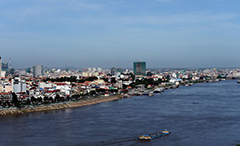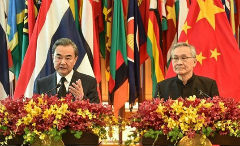Lancang-Mekong Cooperation puts people first, benefits locals
2018-01-09
Xinhua
PHNOM PENH — Though already in December, Cambodia’s capital Phnom Penh is still simmering in hot waves and scorching sunlight. Looking at the sweaty motorcyclists on the street, 20-year-old Chhorn Namchheav sits on a cozy seat at a brand new line 3 bus, enjoying cool air-conditioning on his way home.
A freshman at the National University of Management, Namchheav tours every day from his home in western Phnom Penh suburb to school in central Phnom Penh with a distance of 10 km.
“Previously, I drove my motorcycle to school, but in recent months, I decided to ride bus to school every day,” said Namchheav. “When I rode motorcycle, it was really hot and risky. I choose to ride bus because it’s comfortable, equipped with air-con, and safe.”
Ean Sokhim, director of the Phnom Penh City Bus Authority, told Xinhua that in June, China donated 98 buses and two wreckers to Cambodia to help expand Phnom Penh’s public transport services.
“In the past five months, Phnom Penh’s bus routes have been increased from three lines to eight lines, and our daily passengers have surged from 6,000 to 17,000.”
The buses, made with the latest technology by Zhengzhou Yutong Group Co Ltd, are equipped with advanced technology such as ITS, GPS, cameras and air-conditioning. The Chinese bus-maker also tailor-made these buses to better suit Phnom Penh’s climate and roads, Sokhim said.
After joining the Lancang-Mekong Cooperation (LMC) family in 2016, Cambodia has been an active supporter and enthusiastic participant of the mechanism. On Dec 21, China provided $7.3 million from the LMC Special Fund to Cambodia for carrying out 16 projects in the kingdom, covering a variety of areas including agriculture, tourism, ICT, public health, education and research, water resources, and rural development, among others.
Since the official launch of the LMC mechanism in March 2016, it has established a “3+5” mechanism of cooperation, referring to the three cooperation pillars—political and security issues, economic and sustainable development, and cultural and people-to-people exchanges—and the five key priority areas of connectivity, production capacity, cross-border economic cooperation, water resources, and agriculture and poverty reduction.
Remarkable results have been achieved in implementing all 45 early harvest projects and establishing joint working groups on key priority areas, Foreign Minister Wang Yi said.
Among them is the “Mekong Bright Journey” Plan launched in 2016, which has cured more than 600 cataract patients in Myanmar, Laos, and Cambodia, improved eye sights of 3,000 patients, greatly improving their life quality.
A 70-year-old woman, Daw Thein Khin, comes from Myanmar’s Mandalay province. She has been suffering from cataract for three years, and accepted a professional cataract surgery for free from a Chinese medical team this August.
“After three long years, I can now finally see the blue sky and white cloud, and my daughter’s face! I’m so happy!” she said.
“I’m really thankful to the Chinese doctors who helped me. Thank you for bringing light into my life again!”
The same “light” is also being brought to less developed Mekong country of Laos. Driving from Luang Prabang up north for about one and a half hours, a Nam Ou cascade hydropower station shows itself to visitors.
In November, Power Construction Corporation of China achieved synchronous water closure of its Phase II Nam Ou River-1 and Nam Ou River-7 hydropower station projects in Laos, marking a leap of the hydropower construction project.
Nam Ou drainage basin hydropower development plan is a seven-dam cascade project with total installed capacity of 1,272 MW and annual generating capacity of some 5,000 GWh, which will greatly alleviate the country’s power shortage situation once done.
Bo Ou, 58-year-old chief of Thong Kham village where a Nam Ou cascade hydropower station is located, has witnessed the huge changes of his village.
“Since the project entered our village, many villagers have been employed by the project, and we can sell a lot of things to the Chinese employees here. Our lives are so much better. We are very happy about it,” he told Xinhua.
Now many Chinese power contractors have been working night and day throughout Laos, to inject “electricity” to Laos’ major development plan of becoming the “storage battery on the Indochina Peninsula.”
Since the six Lancang-Mekong countries, i.e. China, Myanmar, Thailand, Laos, Cambodia and Vietnam, planted the cooperation seed one and a half years ago, many fruits have been harvested—all six countries have established LMC National Secretariats/Coordination Units, and joint working groups; most of the 45 Early Harvest Projects and 13 initiatives have been completed or made substantive progress; the first batch of projects of the LMC Special Fund have been completed, among others, creating a unique “Lancang-Mekong speed.”
Experts pointed out that the strong development momentum of the LMC has not only benefited the six countries along the river, but also radiated to neighboring countries in ASEAN.
“The three pillars of the LMC—political and security issues, economic and sustainable development, and social, cultural and people-to-people exchanges—fit with the foundation of ASEAN community building,” said Lu Guangsheng, a professor with Yunnan University.
Highlighting the three major fields the LMC covers, Foreign Minister Wang Yi said the mechanism will promote the alignment with the ASEAN Community and enhance the overall cooperation in the region.


